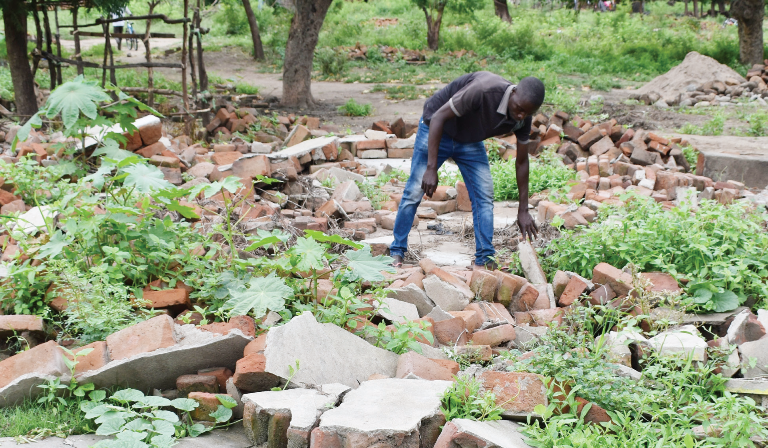Like most of the worst hit survivors of Storm Ana in southern Malawi, Pilirani Mailosi, 34, fled with only the clothes he wore on January 4 this year.
He was among 2 380 survivors in Kanseche Village, Traditional Authority (T/A) Lundu in Chikwawa.
Paulo visits the rubble of what used to be his home
“Floods ripped my home,” he recalls. “There was no time to save anything. I just took my family to safety.”
The tailor lost his only sewing machine, 10 bags of maize and savings to floods that followed three-day torrents. The silted Mwanza River burst its banks, crushing over 500 houses.
The displaced villagers took shelter at a congested camp in Dala Village, T/A Maseya.
Department of Disaster Management Affairs (Dodma) reports that Ana affected about one million people, leaving 190 000 displaced and 46 dead.
In Kanthema Village, T/A Kasisi, the devastating floods wiped out Lameck Paulo’s years of hard work.
On January 24 when Mantchombe River broke its banks, he had brought home 13 cows and 41 goats for sale, but the floods washed them away.
The tragedy reduced Paulo to a beggar in the wink of an eye.
“The sight of my 30 chickens, cows and goats being swept away by water still breaks my heart. I also lost a new motorcycle, two refrigerators and a plasma TV set,” recalls the 33-year-old.
The floods wrecked 270 homes in Kalonga Village, T/A Mlolo, Nsanje.
Patricia Kingsley, 27, says she would have died if the area had no trees.
The villagers clung to trees for two days before being rescued and evacuated to Bangula Camp.
Kingsley explains: “Floods took everything, including my daily drugs.
“My health deteriorated as I spent two weeks without taking the daily drugs.”
Meanwhile, these stories personify the agony of Malawians sinking deep into poverty due to frequent climate-induced disasters.
For them, it is hard to rebuild their lives and livelihoods.
“We are at the mercy of well-wishers and government for handouts. We need safe land and resources to restore our income- generating activities for sustainable recovery,” says Mailosi.
His farmland is now a river.
“We must restart our lives at all cost,” says the father of three now living in a makeshift hut.
Malawi is vulnerable to impoverishing effects of climate change, especially flooding and drought.
However, it is among the least developed countries that contribute the least to global carbon emissions fuelling climate change.
While the poor and marginalised contribute the least to the climate crisis, they are the worst harmed by frequent disasters and lack resources to cope with the loss and damage.
Crises of Inequality, this year’s United Nations (UN) Research Institute for Social Development flagship report, shows the poor tend to suffer the worst consequences of climate change in a “poverty-environment trap”.
“Low income households are likely to be located in or near flood-prone areas, to be displaced due to weather-related disasters and suffer from climate impacts because their livelihoods are directly dependent on agriculture,” reads the report.
Dodma spokesperson Chipiliro Khamula says Malawi requires about K72.7 billion ($71 million) to address the immediate needs of Cyclone Ana’s survivors, “but recovery and intervention needs are higher than the resources available”.
This has made life difficult for survivors who lack food, safe water, sanitation and hygiene facilities.
Ana struck just when flood-prone parts of the Southern Region were struggling to recover from Cyclone Idai, which displaced about 90 000 people and killed 60 in 2019. Post-Idai assessments by Dodma estimated the total loss at $220 million, but about $370.5 million was required for recovery and reconstruction efforts.
The UN study suggests that more emphasis should be placed on social impacts and support systems to meet the affected households’ needs.
The UN’s Food and Agriculture Organisation reports that degraded environment has made Malawians prone to effects of climate change.
In Chikwawa, Kanthema Village Civil Protection Committee chairperson Eneless Peterson says disasters are becoming worse each passing year.
She says: “They choke our development efforts. Floods destroy our crop fields and possessions, deepening hunger and poverty. We also struggle to produce food due to drought and prolonged dry spells.”
The Department of Climate Change and Meteorological Services predicts that the country will experience more extreme weather events, including intense tropical cyclones because of climate change in the future.
Yobu Kachiwanda, the department’s head of public weather services, says the country is vulnerable due to its proximity to the South West Indian Ocean where the cyclones develop and intensify.
He explains why the loss and damage can only get worse: “An average of nine tropical cyclones develop in this part of the ocean.
“Land degradation, poor settlement locations and poor infrastructure development that does not accommodate climate information in the designing also increases the susceptibility of Malawi to cyclones.”n
The post Climate crisis pushes the poor into poverty trap appeared first on The Nation Online.
 Moni Malawi
Moni Malawi 

